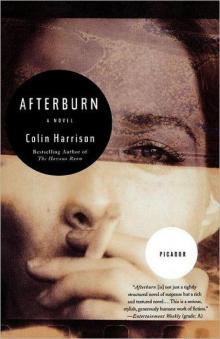Read Afterburn Storyline:
Our ReviewBe ForewarnedColin Harrison's fourth novel, Afterburn, recounts the violent convergence of three desperate, very damaged people, all of whom are searching for the missing element -- love, personal safety, an end to guilt, a sense of genetic continuity -- whose absence dominates their lives. It is a powerful -- and powerfully written -- thriller, but it is also a dark, graphic, and occasionally desolate one. Readers in search of a light, suspenseful diversion should consider themselves warned and look for something else. Afterburn opens with an extended prologue set in Southeast Asia in 1972. With great narrative immediacy, Harrison shows us the dark heart of the American experience in Vietnam by zeroing in on a single character: Charlie Ravich, an American pilot who has flown nearly 100 bombing missions over enemy territory. On his final mission, Charlie is shot down and captured by North Vietnamese troops. For an unspecified period that has the timeless quality of a nightmare, Charlie is imprisoned, questioned, and tortured, before being accidentally rescued and very nearly killed by a roving company of marines. These early scenes of extreme cruelty set the tone for much of the rest of the book. The second section moves the action forward to the fall of 1999. Charlie Ravich, scarred and battered but still a survivor, is once again in the Far East, this time in Hong Kong. Charlie is now the founder and CEO of a telecommunications development company called Technetrix and has come to China to negotiate a loan that will enable him to build a state-of-the-art factory on Chinese soil. By bizarre coincidence, Charlie finds himself first on the scene when billionaire industrialist Henry Lai suffers a fatal heart attack. Within minutes of Lai's death, Charlie parlays his insider's knowledge of that death into a stock market transaction that nets him an instant $16 million profit. Here, and everywhere else in Afterburn, blood and money are inextricably connected. Windfall profits aside, the Charlie Ravich of these later years has fallen on hard times. On a professional level, he is engaged in a constant struggle to keep his company alive and viable in a fiercely competitive market. On a personal level, he has suffered an irreversible series of losses. His wife, Ellie, is behaving erratically and appears to be entering the early stages of Alzheimer's. His son, Ben, is dead, killed by leukemia at the age of 19. His daughter, Julia, is incapable of bearing children. Unable to face the prospect of his bloodline dying out, Charlie decides that, one way or another, he will father a new child, and he initiates a clandestine search for a suitable surrogate mother. Charlie's story is one of three primary narratives that alternate and, eventually, intersect. One of these concerns Christina Welles, a 27-year-old Columbia dropout with a head for numbers and a complicated past. As the novel opens, she is serving a seven-year sentence for her part in a series of truck thefts performed under the auspices of local Mob boss Tony Verducci. When her sentence is suddenly commuted after four years, she goes underground in New York City, believing, with good reason, that the vengeful, unpredictable Verducci has unpleasant plans for her. The third major protagonist is Rick Bocca, a former bodybuilder who was once Christina's lover, as well as her partner in the truck theft ring. Rick has spent four years brooding over Christina's incarceration, believing that she received the punishment that should have been reserved for him. Before the novel is over, he will receive more than his fair share of extreme, and belated, punishment. The driving force behind the plot is Tony Verducci's conviction that Rick will lead him to Christina, who will lead him, in turn, to a cache of money he believes was stolen from him years before. When Charlie Ravich meets Christina in a New York City bar, he enters into a brief, unplanned relationship with her, then finds himself trapped in someone else's nightmare, victimized by forces he can neither understand nor control. By the end of the novel, all of the players have come together in a single room, a modern-day torture chamber in which the rules of the civilized world are suspended, in which everything -- without exception -- is permitted. In the end, Afterburn is a novel about many things: fate, guilt, grief, greed, and the blind human struggle to survive under the most appalling conditions and to establish some connection with the bleak, uncertain future. It is also, at bottom, a novel about cruelty: the unconscious cruelty of the universe and the deliberate, studied cruelty of men who will do anything in the name of money. With a directness and a clarity of expression that is reminiscent -- and worthy -- of Robert Stone, Colin Harrison stares into the abyss of human misery and does not flinch. In Afterburn he has created a grim, graphic, darkly memorable thriller that is difficult to put down and even more difficult to forget. --Bill SheehanPages of Afterburn :
